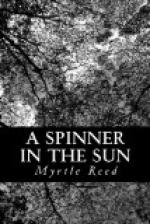Out of her Nessus-robe of agony, Evelina had emerged with one truth. Whatever is may not be right, but it is the outcome of deep and far-reaching forces with which our finite hands may not meddle. The problem has but one solution—adjustment. Hedged in by the iron bars of circumstance as surely as a bird within his cage, it remains for the individual to choose whether he will beat his wings against the bars until he dies, or take his place serenely on the perch ordained for him—and sing.
Within his cage, the bird may do as he likes. He may sleep or eat or bathe, or whet his beak uselessly against the cuttlebone thrust between the bars. He may hop about endlessly and chirp salutations to other birds, likewise caged, or he may try his eager wings in a flight which is little better than no flight at all. His cage may be a large one, yet, if he explores far enough, he will most surely bruise his body against the bars of circumstance. With beak and claws and constant toil he may, perhaps, force an opening in the bars wide enough to get through, slowly, and with great discomfort. He has gained, however, only a larger cage.
If he is a wise bird, he settles down and tries to become satisfied with his surroundings; even to gather pleasure from the gilt wires and the cuttlebone thrust picturesquely between them. When the sea gull wings his majestic way past his habitation, free as the wind itself, the wise bird will close his eyes, and affect not to see. So, also, will the gull, for there is no loneliness comparable with unlimited freedom.
Upon the heights, the great ones stand—alone. To the dweller in the valley, those distant peaks are clad in more than mortal splendour. Time and distance veil the jagged cliffs and hide the precipices. Day comes first to the peaks and lingers there longest; while it is night in the valley, there is still afterglow upon the hills.
Perhaps, some dweller in the valley longs for the height, and sets forth, heeding not the eager hands that, selfishly, as it seems, would keep him within their loving reach. Having once turned his face upward, he does not falter, even for the space of a backward look. He finds that the way is steep, that there is no place to rest, and that the comfort and shelter of the valley are unknown. The sun burns him, and the cold freezes his very blood, for there are only extremes on the way to the peak. Glittering wastes of ice dazzle him and snow blinds him, with terror and not with beauty as from below. The opaline mists are gone, and he sees with dreadful clearness the path which lies immediately ahead.
Beyond, there is emptiness, vast as the desert. At the timber line, he pauses, and, for the first time, looks back. Ah, how fair the valley lies below him! The silvery ribbon of the river winds through a pageantry of green and gold. Upon the banks are woodland nooks, fragrant with growing things and filled with a tender quiet broken only by the murmer of the stream. The turf is soft and cool to the wayfarer’s tired feet, and there is crystal water in abundance to quench his thirst.




